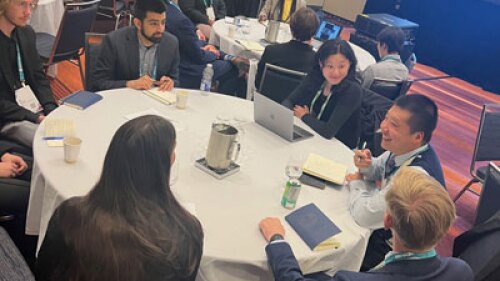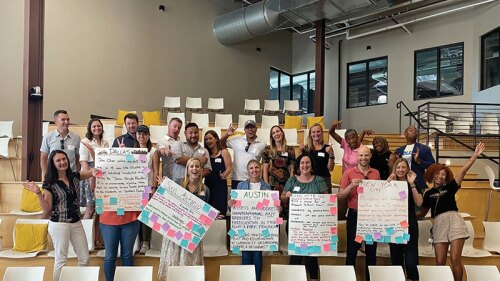Robert E. Simon Jr., real estate icon and founding developer of the pioneering planned community of Reston, Virginia, passed away on September 21 at his home in Reston. He was 101.
Inheriting a fortune from the sale of Carnegie Hall, which had been purchased by his father, Robert Sr., a New York real estate investor, Simon bought 7,000 acres (2,800 ha) in Fairfax County, Virginia, in 1961 to pursue his vision of a mixed-use, walkable community where everyone—renters and owners alike—were welcome.
Simon was well ahead of his time since most midcentury suburbs were auto-oriented bedroom communities with cookie-cutter homes. He also envisioned Reston to be racially integrated—a provocative idea at a time when most communities were either formally or informally segregated.
“If you want to point to one thing that was a complete breakthrough, it was the fact that Reston was set up as an open community from the beginning, before fair housing laws at the national or state level were even passed,” says Chuck Veatch, president of the Charles A. Veatch Company, who was hired by Simon in 1964 upon graduating from the University of Virginia. “When you think about rural northern Virginia as a segregated place, Bob was an incredible leader and made Reston what it was.”
Simon’s goal was to create a self-contained community where residents could live, work, and play in the same neighborhood, cutting down on long commutes and extending the time they spent with their families. He lobbied for higher densities and a mixture of uses at a time when low-density, single-use zoning dominated suburban landscapes. He built a manmade lake, Lake Anne, where homeowners could have their own docks.
“The emphasis was that community was about people, not structures,” Veatch says. “It was about weaving a social fabric and creating gathering places—shops, parks, and plazas—so people could be engaged with one another.”
ULI Foundation Governor James W. Todd met with Simon when he was hired by what became known as Reston Land Development Company, where Todd served as president from 1972 until 1985. Reston, Todd says, was a “brilliant idea,” but a premature one. At the time, downtown Washington, D.C., was the region’s major job center, and Reston struggled to attract major employers that were a key piece of Simon’s live/work/play vision. Metro, the Washington area’s mass transit system, was still a decade away from opening, and the only access to Reston was a two-lane road.
“What Bob had was a wonderful concept, but it was too far away from the heart of activity at a time when the majority of people were still going downtown to work,” Todd says.
By the late 1960s, home sales had not picked up the pace necessary to sustain a project of Reston’s scale. Simon was forced out of the company by Gulf Reston, a corporate partner he had brought on to fund the rest of the town’s construction. Ultimately, though, Simon was proven right: Reston turned into an incredibly successful community after the U.S. Geological Survey and other private employers relocated there and Fairfax County became a booming high-tech corridor. The Reston Town Center—an idea Simon wanted to pursue—has become a thriving commercial, office, and retail district.
After leaving the company in 1967, Simon continued to work in real estate development, and returned to Reston to live upon his retirement in 1993. Veatch says that Simon harbored no bitterness about past events and continued to participate in focus groups and planning meetings to make Reston a better place. “He absolutely loved [Reston],” Veatch says. “He threw himself wholeheartedly into making Reston the community he [had] envisioned it to be.”




